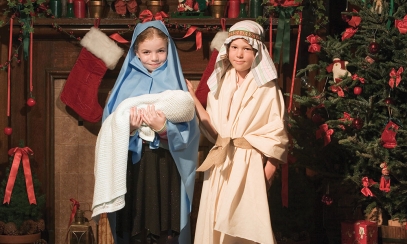
Mom’s unconditional love knows no favorites
A few years ago, I presented my parents with an obnoxious card, which read something like, “I love how we don’t even have to say out loud that I’m your favorite child.” I’m hilarious, I know. For years, I’ve marveled that my parents dispersed seemingly limitless and unconditional amounts of kindness and attention evenly among myself and my siblings. The older I grew, the more I marveled at their consistent support — no matter how exasperating we were, they loved us all.
A few years ago, I presented my parents with an obnoxious card, which read something like, “I love how we don’t even have to say out loud that I’m your favorite child.” I’m hilarious, I know. For years, I’ve marveled that my parents dispersed seemingly limitless and unconditional amounts of kindness and attention evenly among myself and my siblings. The older I grew, the more I marveled at their consistent support — no matter how exasperating we were, they loved us all.
Once I became a mom, I realized that’s just how it is. Seemingly overnight, there’s a tiny human in your life that you love unconditionally — even when they’re sick at 3 a.m., announcing they need poster board for a project that’s due tomorrow or, as one happens to be doing right now, repetitively throwing their new ball against your office door. While it’s not always easy or quiet, life has new meaning when it’s spent giving unconditional love. And as our family grew, I can honestly say that my love for each child is unconditional. They are all my favorites.
May is a unique season to reflect on the reality that as humans we share a mother. Mary, the mother of Christ, was given to all of us when he announced from the cross — “Behold, your mother” (Jn 19:27). Like our earthly parents and their unconditional support, we can see God sending Mary as a messenger of his love to all his children, to myriad locations throughout history.
In Redemptoris Mater, St. John Paul II describes sites like Lourdes, Fatima, Guadalupe and many others around the world as “places of pilgrimage where the people of God seek to meet the Mother of God in order to find, within the radius of the maternal presence of her, ‘who believed,’ a strengthening of their own faith” (28).
The many places around the world that Mary has shared God’s message of peace and love is a powerful reminder that like any good earthly parent, God our heavenly Father has no “favorites.” No group of people, country, political party or leader has the highest value or dignity over others to the Creator of all things.
Furthermore, St. John Paul II describes the prayer of Mary in the Gospel of Luke as a beautiful statement of the “Church’s love of preference for the poor,” proclaiming that God “has cast down the mighty from their thrones, and lifted up the lowly … filled the hungry with good things, sent the rich away empty … scattered the proud-hearted … and His mercy is from age to age …” (RM 37).
In these confusing times, Mary’s words in sacred Scripture and her messages in countless lands throughout history emphasize the dignity of each person — with a warning to those who seek “greatness” and power at the expense of the weak. In total humility, Mary, the queen of heaven and earth, “proclaims the greatness of the Lord” (Lk 1:46).
Parents have no favorites and the Marian themes of May are a grounding and a reminder of our call to holiness, the dignity of our brothers and sisters throughout the world and our ultimate hope not lying in any earthly kingdom, but in the eternal kingdom of heaven.
Alison Blanchet, LMHC, lives in Panama City with her husband and three children. She works as a therapist for children and teens. Email her at alisondblanchet@gmail.com.



